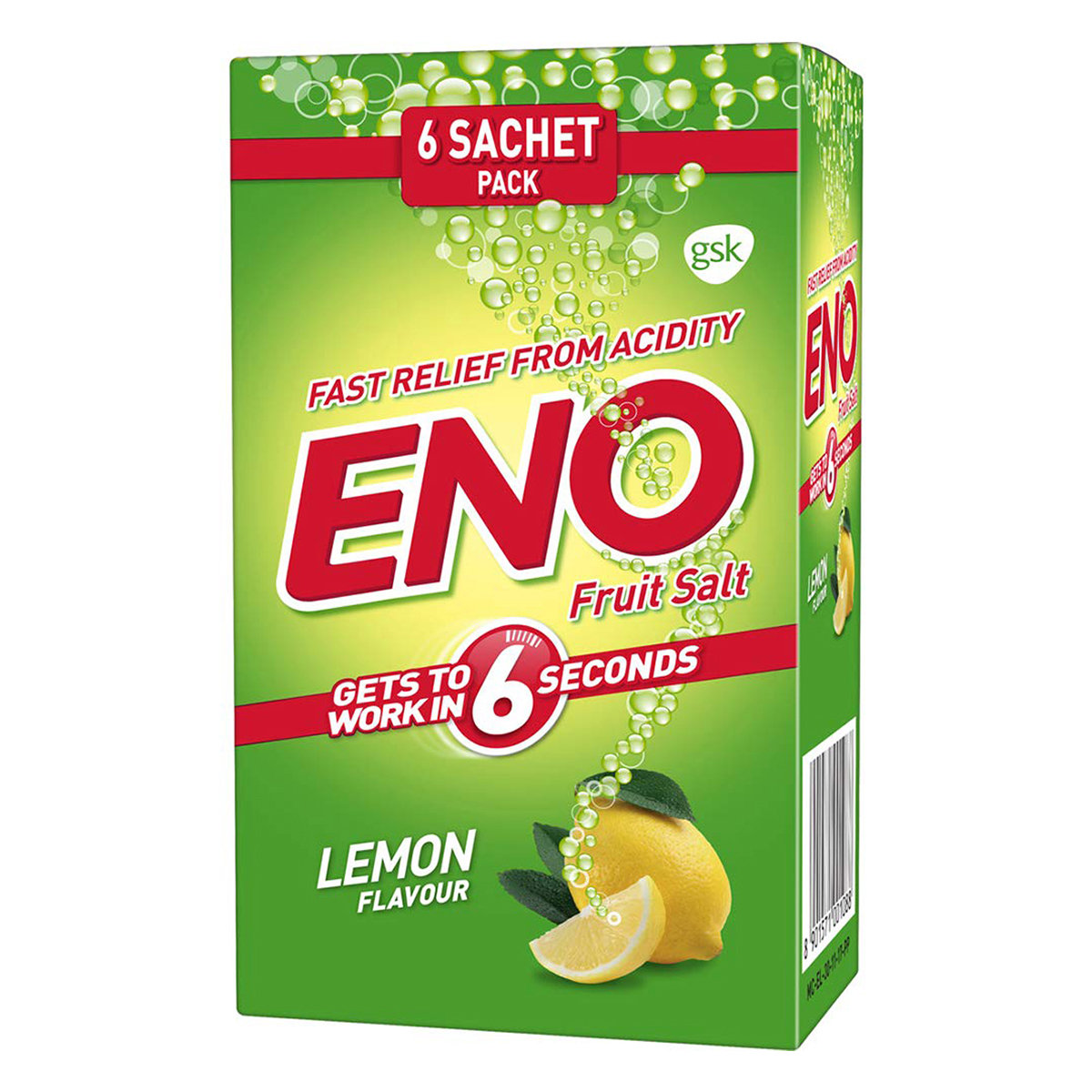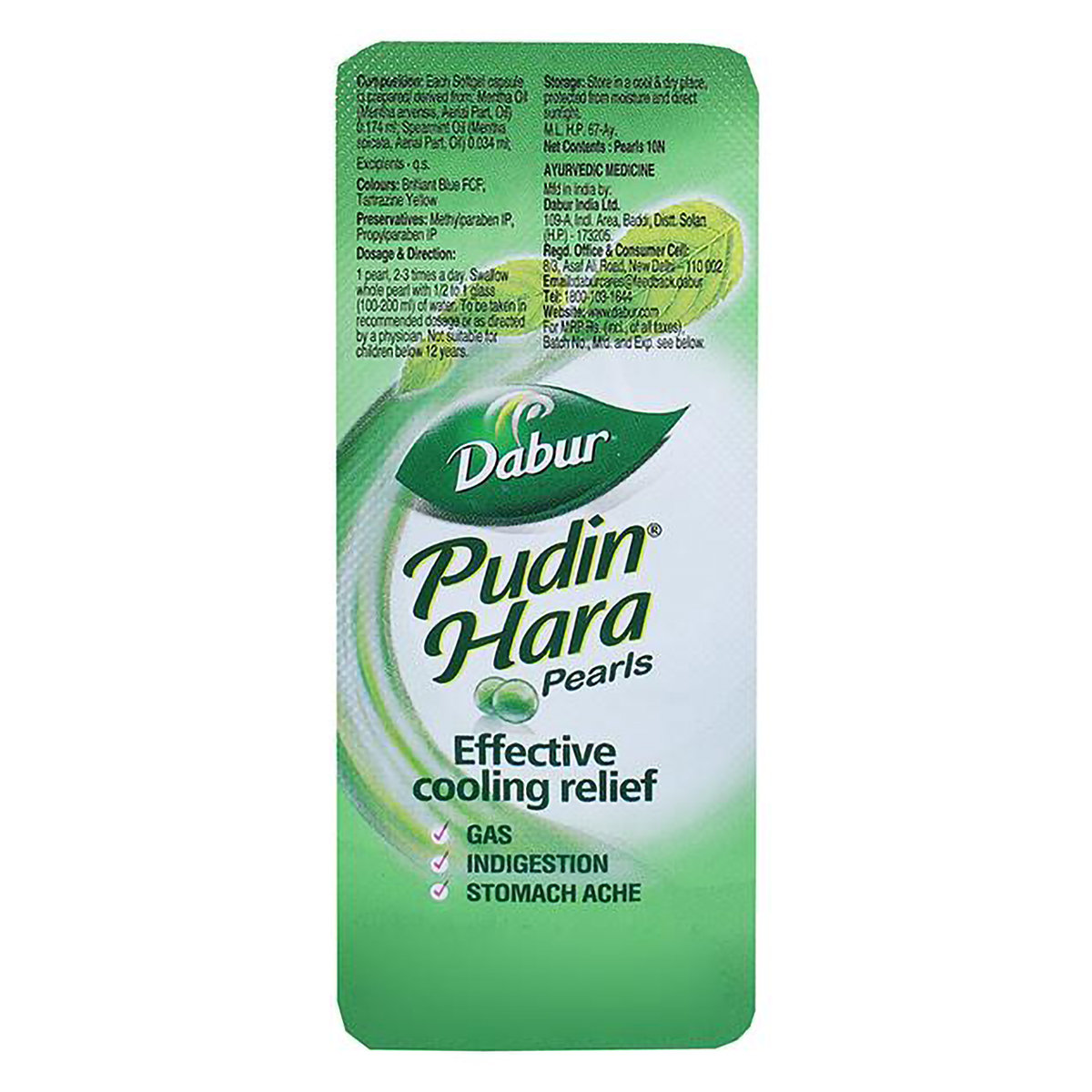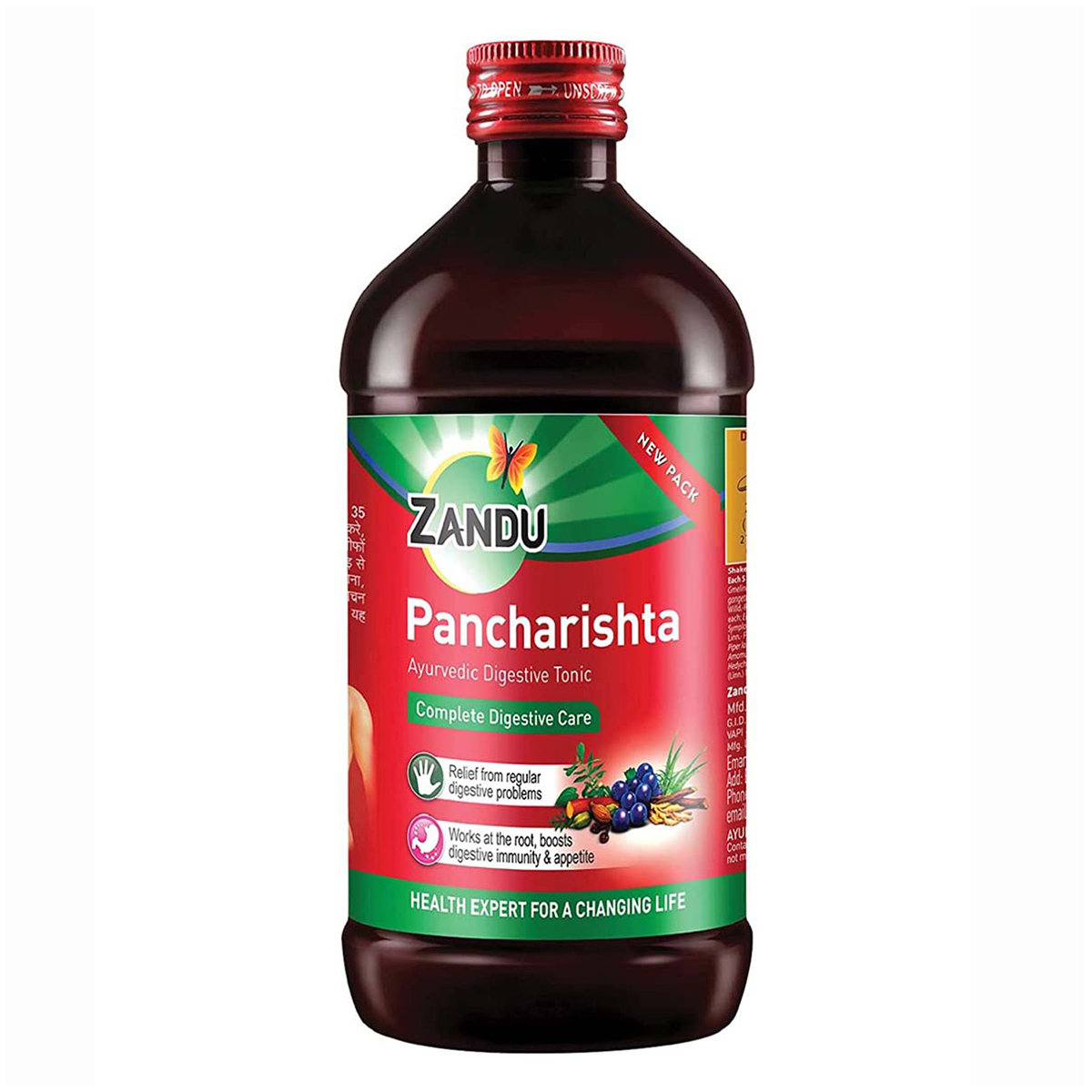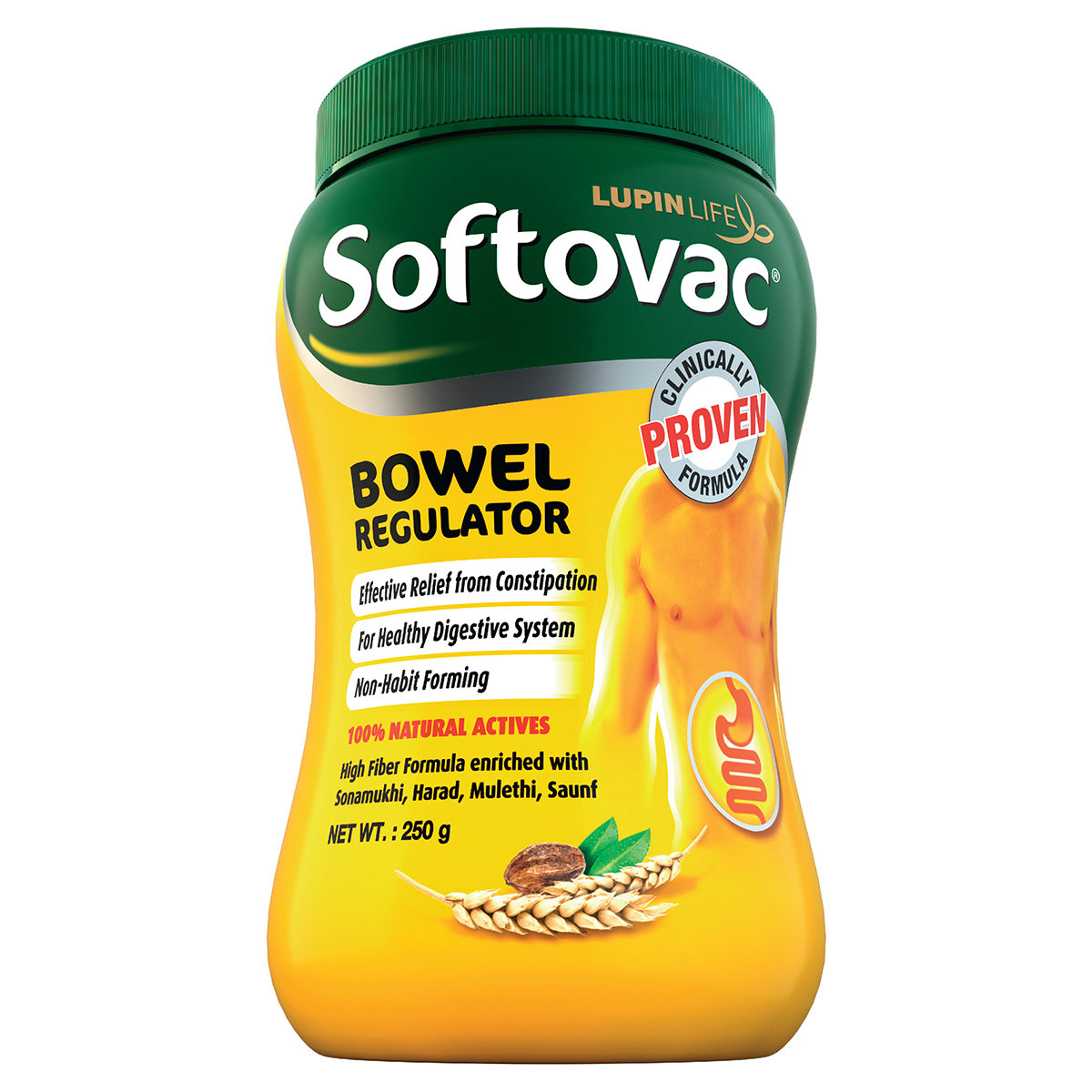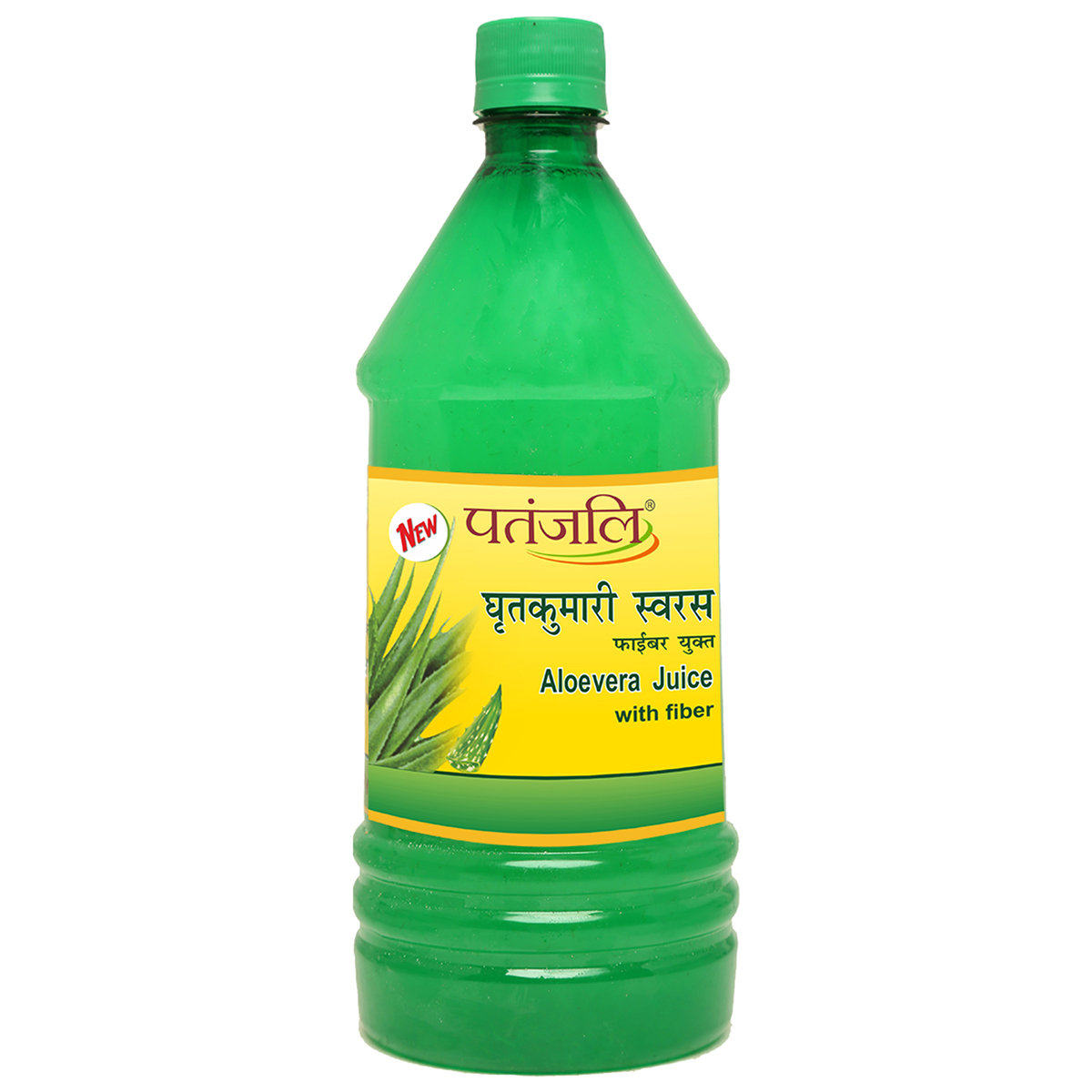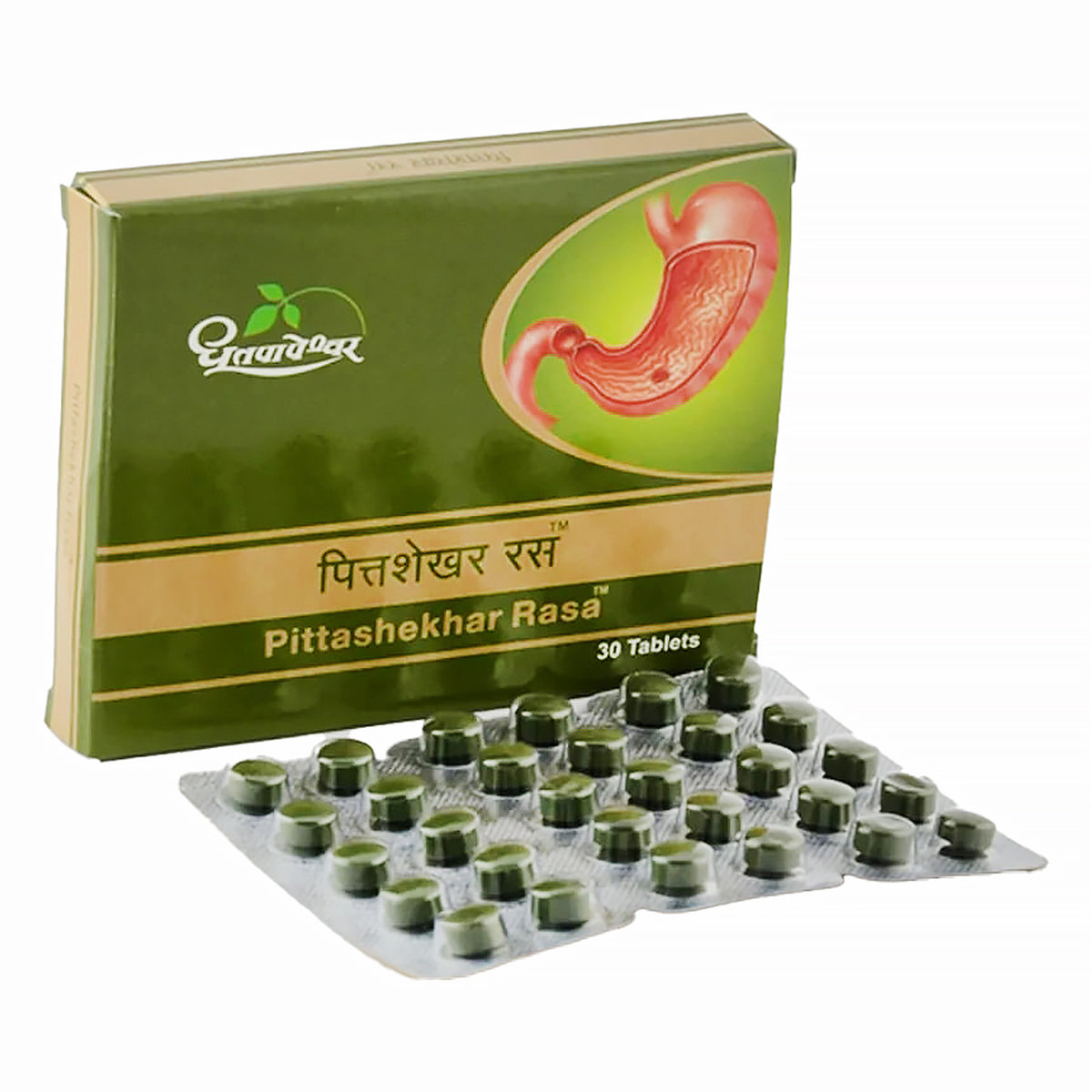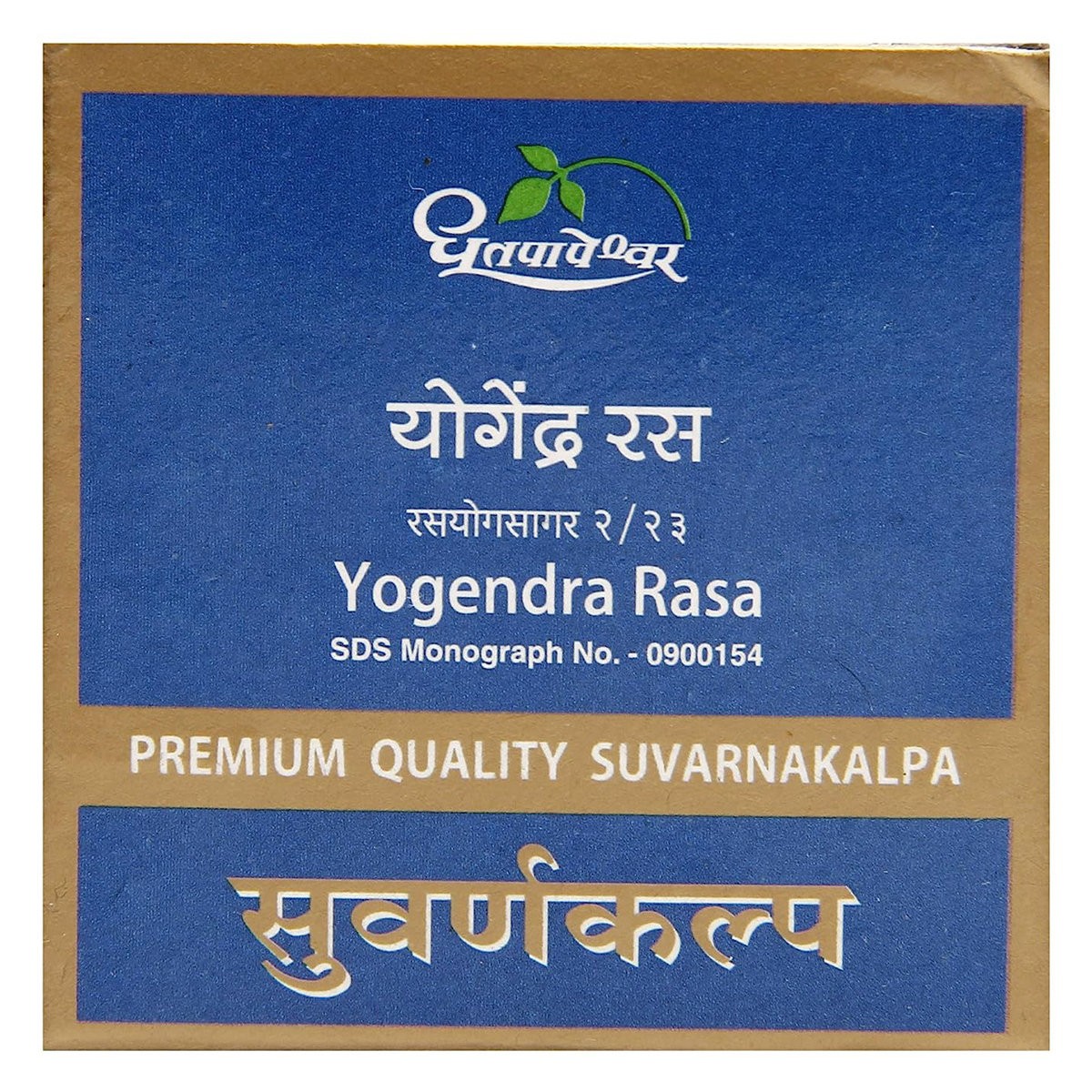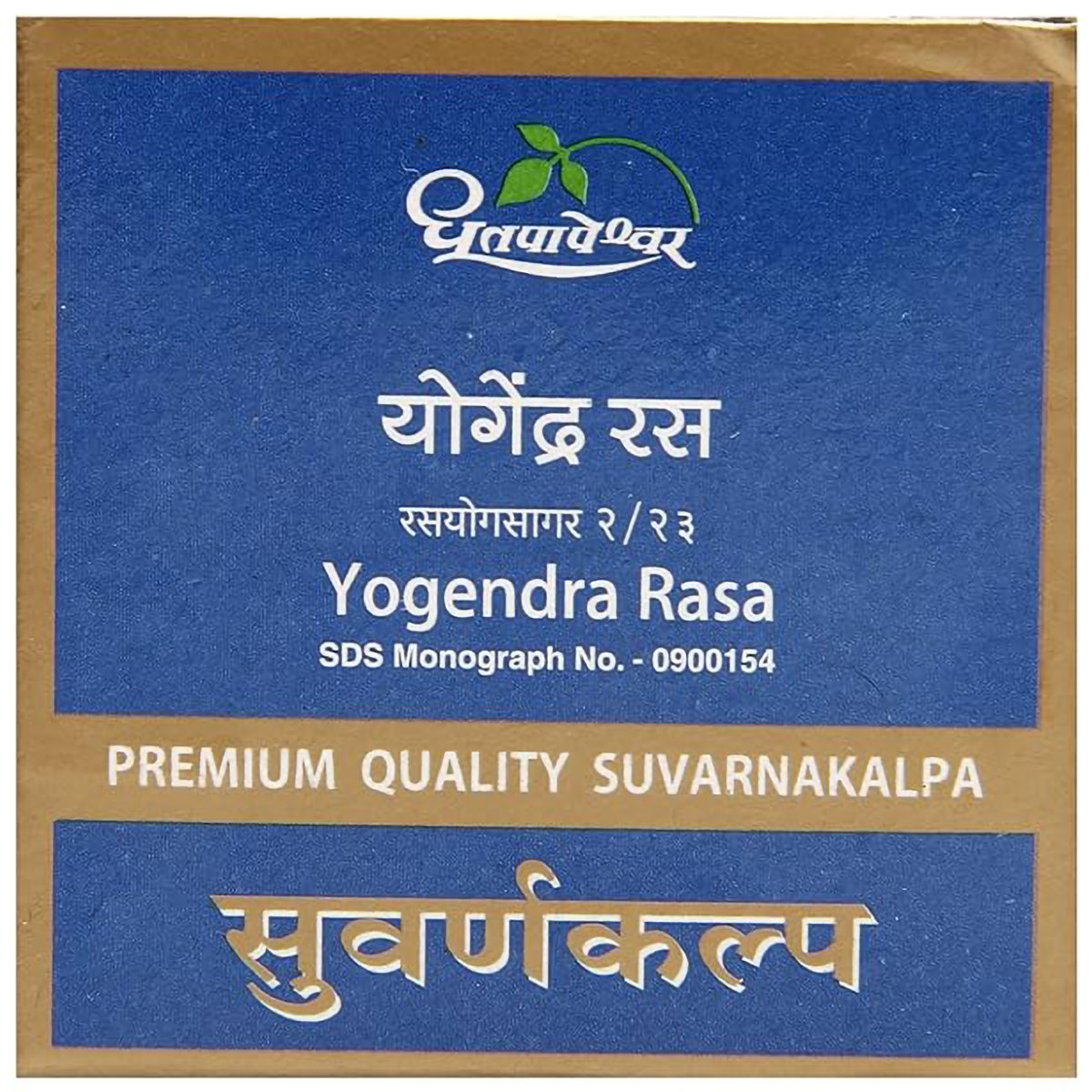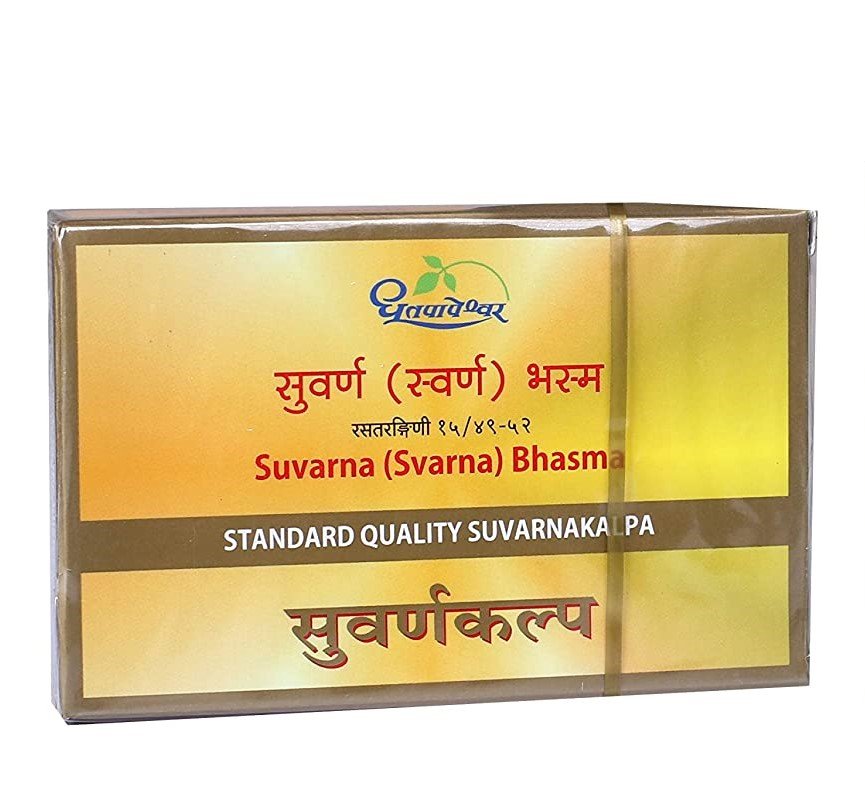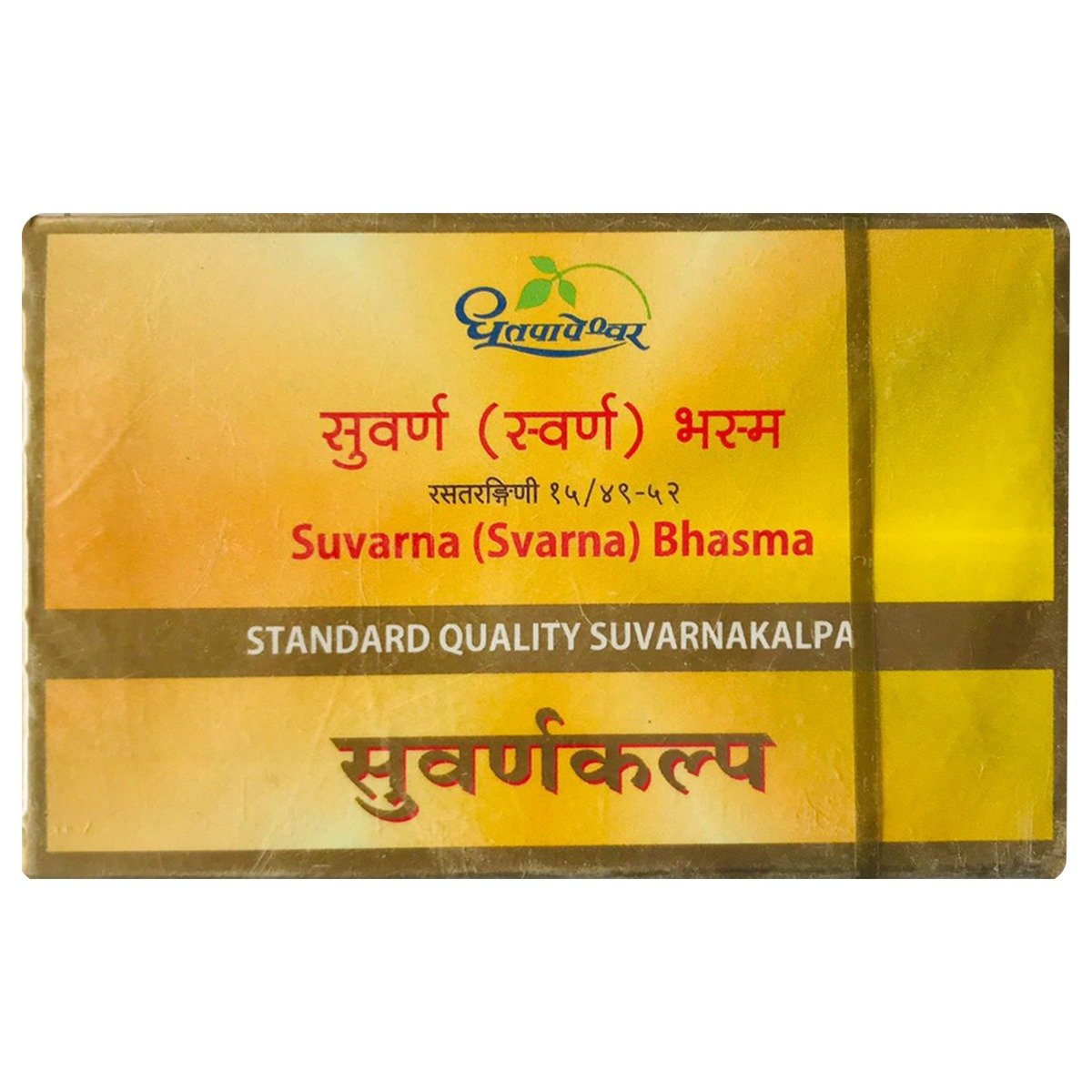डीडीआर-डी 60/30 कैप 10'एस
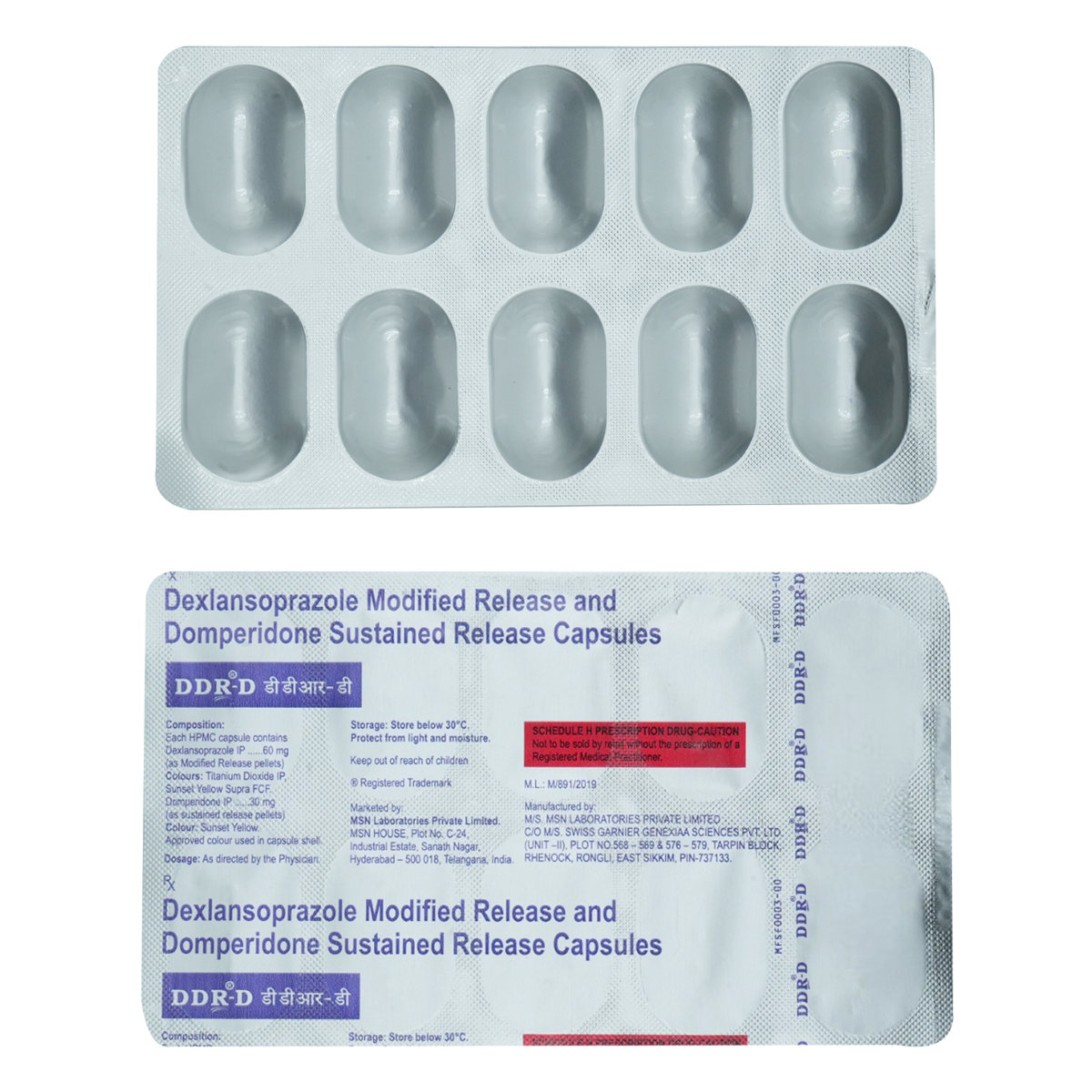
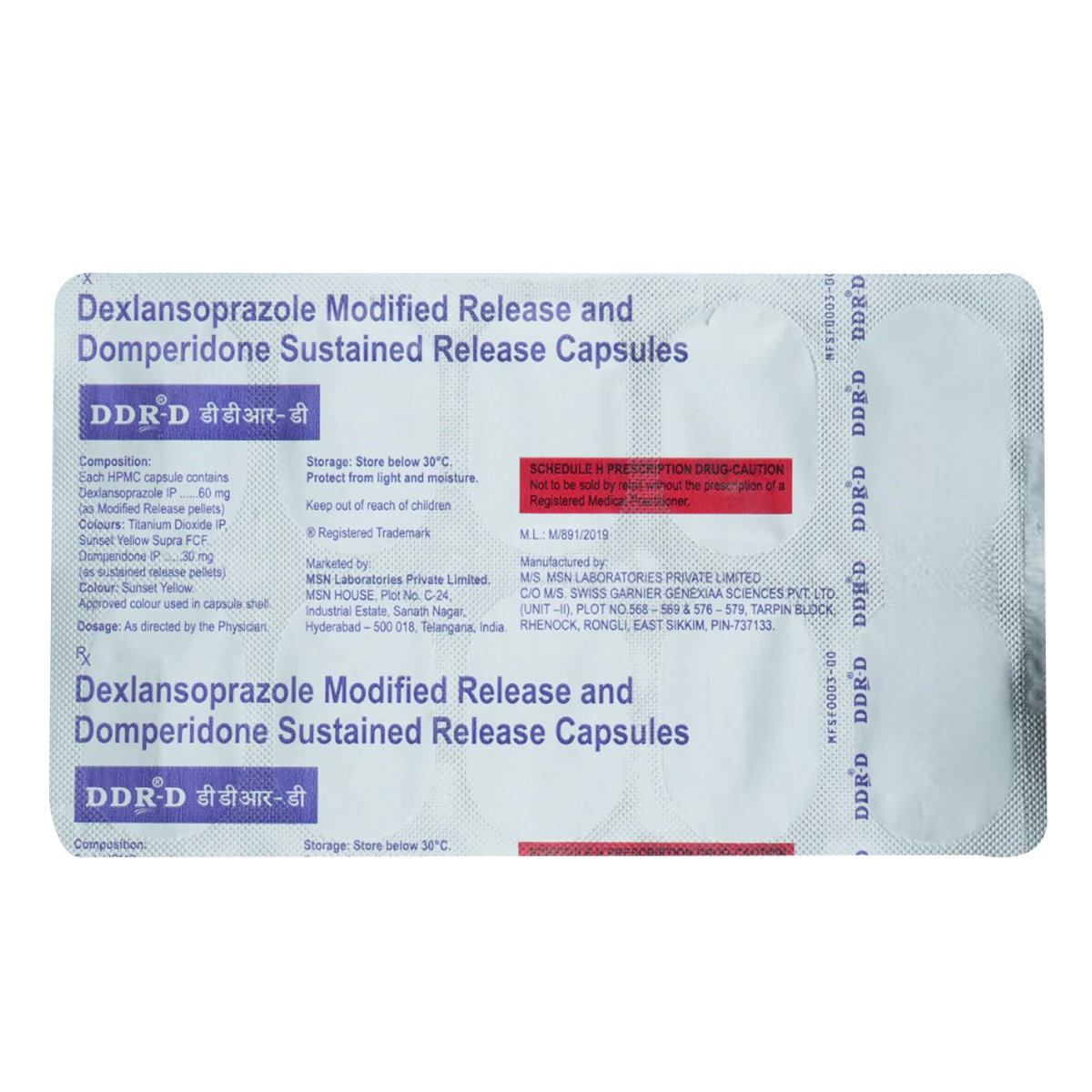
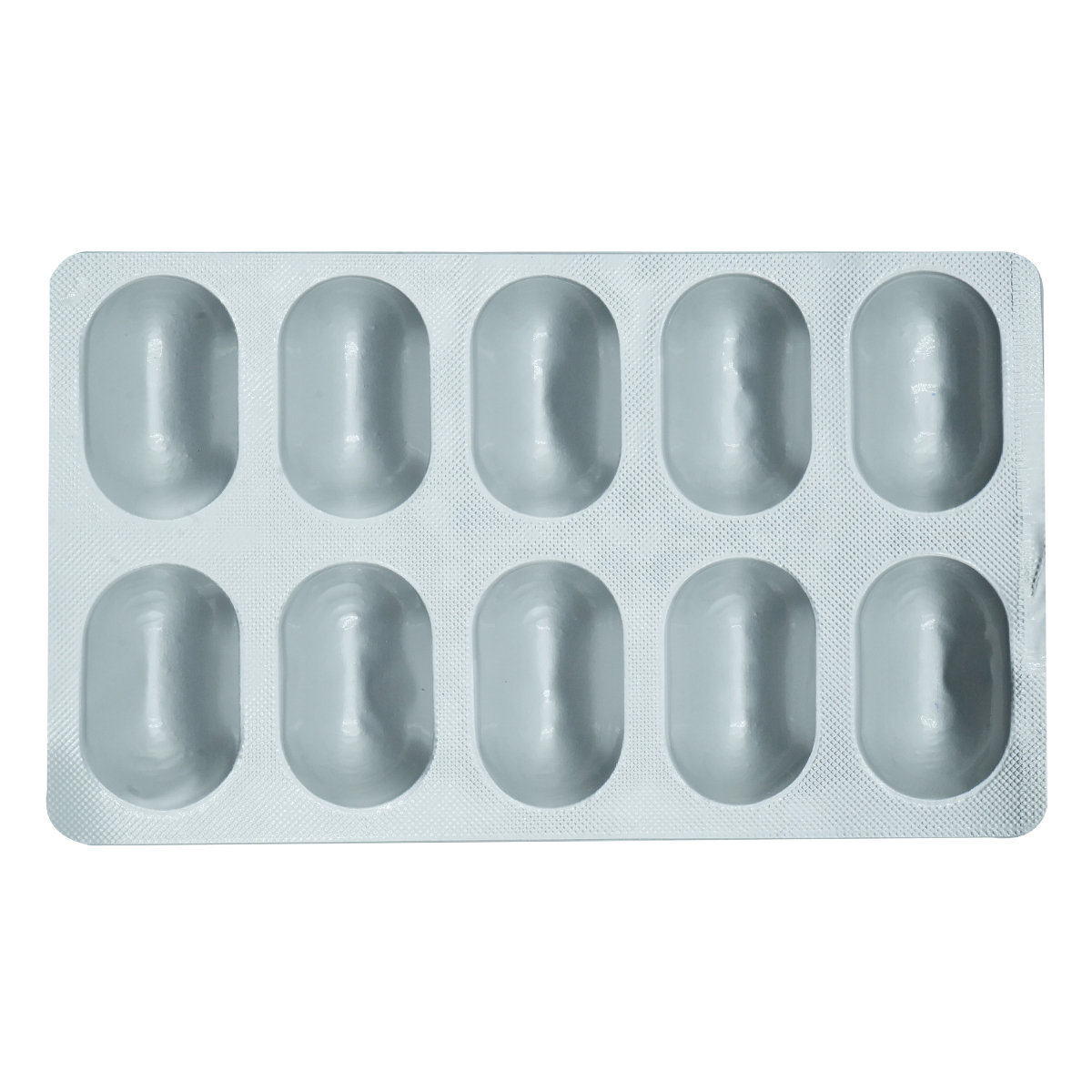
₹229
(Inclusive of all Taxes)
₹34.4 Cashback (15%)
Ddr-D 60/30 Cap is used to treat gastroesophageal reflux disease (GERD) and relieve heartburn. It contains Dexlansoprazole and Domperidone. It works by inhibiting the action of proton pumps, which produce stomach acid. As a result, it reduces the amount of acid the stomach produces while preventing excess acid from flowing back into the food pipe. It also inhibits dopamine receptors in the upper digestive tract. As a result, food moves more quickly through the stomach and into the intestine.
Know Your Delivery Time
Provide Delivery Location
 Prescription drug
Prescription drugWhats That
 61 people bought
61 people bought 
Secure Payment

India's Most Trusted Pharmacy

Genuine Products
- Drink water or other clear fluids.
- To prevent worsening of pain, limit intake of tea, coffee, or alcohol.
- Include bland foods like rice, toast, crackers, and rice in your diet.
- Avoid lying down immediately after eating as it may cause indigestion or heartburn.
- Avoid acidic and spicy food as it may cause indigestion.
- Inform Your Doctor: Notify your doctor immediately about your diarrhoea symptoms. This allows them to adjust your medication or provide guidance on managing side effects.
- Stay Hydrated: Drink plenty of fluids to replace lost water and electrolytes. Choose water, clear broth, and electrolyte-rich drinks. Avoid carbonated or caffeinated beverages to effectively rehydrate your body.
- Follow a Bland Diet: Eat easy-to-digest foods to help firm up your stool and settle your stomach. Try incorporating bananas, rice, applesauce, toast, plain crackers, and boiled vegetables into your diet.
- Avoid Trigger Foods: Steer clear of foods that can worsen diarrhoea, such as spicy, fatty, or greasy foods, high-fibre foods, and dairy products (especially if you're lactose intolerant).
- Practice Good Hygiene: Maintain good hygiene to prevent the spread of infection. To stay healthy, wash your hands frequently, clean and disinfect surfaces regularly, and avoid exchanging personal belongings with others.
- Take Anti-Diarrheal Medications: If your doctor advises, anti-diarrheal medications such as loperamide might help manage diarrhoea symptoms. Always follow your doctor's directions.
- Keep track of your diarrhoea symptoms. If they don't get better or worse or are accompanied by severe stomach pain, blood, or dehydration signs (like extreme thirst or dark urine), seek medical help.
- Inform your doctor about dry mouth symptoms. They may adjust your medication regimen or prescribe additional medications to manage symptoms.
- Drink plenty of water throughout the day to help keep your mouth moist and alleviate dry mouth symptoms.
- Chew sugar-free gum or candies to increase saliva production and keep your mouth moisturized.
- Use saliva substitutes, such as mouthwashes or sprays, only if your doctor advises them to help moisturize your mouth and alleviate dry mouth symptoms.
- Avoid consuming smoking, alcohol, spicy or acidic foods, and other irritants that may aggravate dry mouth symptoms.
- Schedule regular dental check-ups to keep track of your oral health and handle any dry mouth issues as they arise.
- Tell your doctor about your GAS symptoms. They may change your medication regimen or prescribe additional drugs to help you manage them.
- To manage GAS symptoms, eat a balanced diet of fibre, vegetables, and fruits.
- Drink enough water throughout the day to avoid constipation and treat GAS symptoms.
- Regular exercise like yoga and walking may help stimulate digestion and alleviate GAS symptoms.
- Take probiotics only if your doctor advises, as they may help alleviate GAS symptoms by promoting gut health.
- Take medication for GAS symptoms only if your doctor advises, as certain medications can interact with your existing prescriptions or worsen symptoms.
- If symptoms persist, worsen, or are accompanied by severe abdominal pain, vomiting, or bleeding, seek immediate medical attention.
- Inform your doctor about the symptoms you're experiencing due to medication.
- Your doctor may adjust your treatment plan, which could include changing your medication, adding new medications, or offering advice on managing your symptoms.
- Practice good hygiene, including frequent handwashing, avoiding close contact with others, and avoiding sharing utensils or personal items.
- Stay hydrated by drinking plenty of fluids to help loosen and clear mucus from your nose, throat, and airways.
- Get plenty of rest and engage in stress-reducing activities to help your body recover. If your symptoms don't subside or worsen, consult your doctor for further guidance.
- Inform your doctor about the nausea and discuss possible alternatives to the medication or adjustments to the dosage.
- Divide your daily food intake into smaller, more frequent meals to reduce nausea.
- Opt for bland, easily digestible foods like crackers, toast, plain rice, bananas, and applesauce.
- Avoid certain foods that can trigger nausea, such as fatty, greasy, spicy, and smelly foods.
- Drink plenty of fluids, such as water, clear broth, or electrolyte-rich beverages like coconut water or sports drinks.
- Use ginger (tea, ale, or candies) to help relieve nausea.
- Get adequate rest and also avoid strenuous activities that can worsen nausea.
- Talk to your doctor about taking anti-nausea medication if your nausea is severe.
- Record when your nausea occurs, what triggers it, and what provides relief to help you identify patterns and manage your symptoms more effectively.
- Preventing Vomiting (Before it Happens)
- Take medication exactly as prescribed by your doctor. This can help minimize side effects, including vomiting.
- Having a small meal before taking your medication can help reduce nausea and vomiting.
- Talk to your doctor about taking anti-nausea medication along with your prescribed medication.
- Managing Vomiting (If it Happens)
- Try taking ginger in the form of tea, ale, or candy to help alleviate nausea and vomiting.
- What to Do if Vomiting Persists
- Consult your doctor if vomiting continues or worsens, consult the doctor for guidance on adjusting your medication or additional treatment.
Drug-Drug Interactions
Drug-Drug Interactions
Login/Sign Up
Co-administration of DDR-D 60 mg/30 mg Capsule may decrease the absorption and blood levels of Nelfinavir making it less effective.
How to manage the interaction:
Taking DDR-D 60 mg/30 mg Capsule with Nelfinavir can possibly lead to an interaction. Consult a doctor if you have any concerns, he/she may prescribe alternatives that do not interact. Do not discontinue the medication without consulting a doctor.
Co-administration of Methotrexate with DDR-D 60 mg/30 mg Capsule can increase the levels and side effects of Methotrexate.
How to manage the interaction:
Although there is a possible interaction between Methotrexate and DDR-D 60 mg/30 mg Capsule, you can take these medicines together if prescribed by your doctor. However, if you experience any symptoms such as tiredness, dizziness, fainting, unusual bleeding or bruising, chills, fever, sore throat, or body pains. Consult a doctor immediately. Do not stop using medications without a doctor's advice.
Co-administration of DDR-D 60 mg/30 mg Capsule decreases blood levels of Dasatinib.
How to manage the interaction:
Taking DDR-D 60 mg/30 mg Capsule with Dasatinib can lead to an interaction. Consult a doctor if you experience any unusual symptoms. Do not discontinue the medication without consulting a doctor.
Co-administration of DDR-D 60 mg/30 mg Capsule with Erlotinib may interfere with the absorption of erlotinib making it less effective.
How to manage the interaction:
Taking DDR-D 60 mg/30 mg Capsule with Erlotinib can possibly lead to an interaction. Consult a doctor if you have any concerns, he/she may prescribe alternatives that do not interact. Do not discontinue the medication without consulting a doctor.
Taking tacrolimus with DDR-D 60 mg/30 mg Capsule may significantly increase the blood levels of tacrolimus which may lead to infections, high sugars, kidney problems, high blood pressure, heart problems, low magnesium levels and hyperkalemia(high potassium levels in the blood),
How to manage the interaction:
Although there is a possible interaction, DDR-D 60 mg/30 mg Capsule can be taken with tacrolimus if prescribed by the doctor. However, consult the doctor if you experience irregular heart rhythm, palpitations, muscle spasm, shaking, and seizures(fits). Do not stop using any medications without consulting a doctor.
Co-administration of DDR-D 60 mg/30 mg Capsule may interfere with the absorption of gefitinib into the bloodstream and reduce its effectiveness.
How to manage the interaction:
Although there is a possible interaction, DDR-D 60 mg/30 mg Capsule can be taken with gefitinib if advised by a doctor. Do not stop using any medications without talking to a doctor.
Co-administration of DDR-D 60 mg/30 mg Capsule may decrease the absorption and blood levels of Atazanavir, making it less effective.
How to manage the interaction:
Taking DDR-D 60 mg/30 mg Capsule with Atazanavir can possibly lead to an interaction. Consult a prescriber, the doctor may suggest safer alternatives if you require treatment for stomach acid or ulcer while you are being treated with atazanavir. Do not discontinue the medication without consulting a doctor.
Co-administration of DDR-D 60 mg/30 mg Capsule may interfere with the absorption of Acalabrutinib capsules and reduce its effectiveness.
How to manage the interaction:
Consult your doctor if you are taking DDR-D 60 mg/30 mg Capsule and acalabrutinib. The doctor may prescribe alternatives that do not interact with acalabrutinib or interact to a lesser extent.
Co-administration of DDR-D 60 mg/30 mg Capsule may interfere with the absorption of Pazopanib and reduce its effectiveness.
How to manage the interaction:
Although there is a possible interaction, DDR-D 60 mg/30 mg Capsule can be taken with Pazopanib if prescribed by the doctor. Do not stop using any medication without consulting your doctor.
Coadministration of DDR-D 60 mg/30 mg Capsule with Ritonavir can increase the blood levels of DDR-D 60 mg/30 mg Capsule.
How to manage the interaction:
There may be a possibility of interaction between DDR-D 60 mg/30 mg Capsule and Ritonavir, but it can be taken if prescribed by a doctor. In case you experience any side effects like swelling of the ankles or feet, unusual tiredness, redness, changes in menstrual ability, contact a doctor. It is recommended to do this to ensure your heart stays healthy. Do not stop using any medications without talking to a doctor.
Drug-Food Interactions
Drug-Food Interactions
Login/Sign Up

Have a query?
FAQs
Customers Also Bought
Disclaimer
Author Details
We provide you with authentic, trustworthy and relevant information
Buy best Gastro Enterology products by
Abbott India Ltd
Sun Pharmaceutical Industries Ltd
Cipla Ltd
Alkem Laboratories Ltd
Torrent Pharmaceuticals Ltd
Mankind Pharma Pvt Ltd
Intas Pharmaceuticals Ltd
Lupin Ltd
Dr Reddy's Laboratories Ltd
Aristo Pharmaceuticals Pvt Ltd
Leeford Healthcare Ltd
Alembic Pharmaceuticals Ltd
La Renon Healthcare Pvt Ltd
Macleods Pharmaceuticals Ltd
Wallace Pharmaceuticals Pvt Ltd
J B Chemicals & Pharmaceuticals Ltd
Zydus Healthcare Ltd
Morepen Laboratories Ltd
Micro Labs Ltd
Zydus Cadila
Fourrts India Laboratories Pvt Ltd
Zuventus Healthcare Ltd
FDC Ltd
Alniche Life Sciences Pvt Ltd
Cadila Pharmaceuticals Ltd
Tas Med India Pvt Ltd
Eris Life Sciences Ltd
Medishri Healthcare Pvt Ltd
Medley Pharmaceuticals Ltd
Signova Pharma
Elder Pharmaceuticals Ltd
Sanatra Healthcare Ltd
East West Pharma India Pvt Ltd
Tablets India Ltd
Wockhardt Ltd
Emcure Pharmaceuticals Ltd
Vasu Organics Pvt Ltd
Ajanta Pharma Ltd
Akumentis Healthcare Ltd
Glenmark Pharmaceuticals Ltd
Cadila Healthcare Ltd
Primus Remedies Pvt Ltd
Biological E Ltd
Corona Remedies Pvt Ltd
Blue Cross Laboratories Pvt Ltd
Indoco Remedies Ltd
Medgen Drugs And Laboratories Pvt Ltd
Hetero Drugs Ltd
Ipca Laboratories Ltd
Pfizer Ltd
DR Johns Lab Pharma Pvt Ltd
Ozone Pharmaceuticals Ltd
Systopic Laboratories Pvt Ltd
Albert David Ltd
Indchemie Health Specialities Pvt Ltd
Ordain Health Care Global Pvt Ltd
Biochem Pharmaceutical Industries Ltd
Samarth Life Sciences Pvt Ltd
Shine Pharmaceuticals Ltd
Shreya Life Sciences Pvt Ltd
Troikaa Pharmaceuticals Ltd
Hetero Healthcare Pvt Ltd
Knoll Healthcare Pvt Ltd
Lincoln Pharmaceuticals Ltd
Olcare Laboratories Pvt Ltd
Prevego Healthcare & Research Pvt Ltd
Adonis Laboratories Pvt Ltd
Capital Pharma
Eskag Pharma Pvt Ltd
Foregen Healthcare Ltd
Sanzyme Pvt Ltd
Yuventis Pharmaceuticals
3M India Ltd
Alienist Pharmaceutical Pvt Ltd
Dey's Medical Stores (Mfg) Ltd
Meridian Enterprises Pvt Ltd
Meyer Organics Pvt Ltd
Sinsan Pharmaceuticals Pvt Ltd
Chemo Healthcare Pvt Ltd
Intra Life Pvt Ltd
Levin Life Sciences Pvt Ltd
Msn Laboratories Pvt Ltd
Overseas Health Care Pvt Ltd
RPG Life Sciences Ltd
Steris Healthcare
Medwock Pharmaceuticals Pvt Ltd
Obsurge Biotech Ltd
Panacea Biotec Ltd
Saf Fermion Ltd
Sargas Life Sciences Pvt Ltd
USV Pvt Ltd
Aar Ess Remedies Pvt Ltd
Comed Chemicals Ltd
Galpha Laboratories Ltd
Indiabulls Pharmaceuticals Pvt Ltd
Seagull Pharmaceutical Pvt Ltd
Syndicate Life Sciences Pvt Ltd
Votary Laboratories (India) Ltd
Win Medicare Ltd
Biophar Lifesciences Pvt Ltd
Caplet India Pvt Ltd
Cnx Health Care Pvt Ltd
German Remedies Ltd
Icarus Health Care Pvt Ltd
Intra Labs India Pvt Ltd
Laborate Pharmaceuticals India Ltd
Lia Life Sciences Pvt Ltd
Megma Healthcare Pvt Ltd
Piramal Enterprises Ltd
RSL Bioscience Pvt Ltd
Rapross Pharmaceuticals Pvt Ltd
Ronyd Healthcare Pvt Ltd
Unimarck Healthcare Pvt Ltd
Zee Laboratories Ltd
Apellon Biotech
Biorex Healthcare Pvt Ltd
Gh Vision Care Life Sciences
Khandelwal Laboratories Pvt Ltd
Kinesis Pharmaceuticals Pvt Ltd
Merck Ltd
Nexeum Pharmaceutical Ltd
Raptakos Brett & Co Ltd
Saffron Formulations Pvt Ltd
Saffron Therapeutics Pvt Ltd
Solariz Healthcare Pvt Ltd
Torque Pharmaceuticals Pvt Ltd
Unison Pharmaceuticals Pvt Ltd
Aareen Healthcare Pvt Ltd
Alteus Biogenics Pvt Ltd
Aurz Pharmaceutical Pvt Ltd
Bioceutics Inc
Cachet Pharmaceuticals Pvt Ltd
Daris Biocare
Delcure Life Sciences Ltd
Endocard India Pvt Ltd
Geno Pharmaceuticals Pvt Ltd
Ind-Swift Ltd
Medford Pharmaceuticals
Sain Medicaments Pvt Ltd
Septalyst Lifesciences Pvt Ltd
Shankus Acme Pharma Pvt Ltd
Silver Cross Medisciences Pvt Ltd
Spacilac Healthcare Pvt Ltd
Strassenburg Pharmaceuticals Ltd
Sundyota Numandis Pharmaceuticals Pvt Ltd
Symbiosis Pharmaceuticals Pvt Ltd
Unipark Biotech Pvt Ltd
Algen Healthcare Ltd
Asprant Life Science Pvt Ltd
Azmed Healthcare
BSA Pharma Inc
Biochemix Health Care Pvt Ltd
Brinton Pharmaceuticals Ltd
Carey Pharma
Dolvis Bio Pharma Pvt Ltd
Dr Moni Pharmaceuticals Pvt Ltd
East India Pharmaceutical Works Ltd
Econ Healthcare
Ergos Life Sciences Pvt Ltd
Eysys Pharmaceutical Pvt Ltd
Franco Indian Pharmaceuticals Pvt Ltd
Galacus Healthcare Pvt Ltd
Grandcure Healthcare Pvt Ltd
Gutford Pharmaceuticals
Heal (India) Laboratories Pvt Ltd
Ikon Remedies Pvt Ltd
Medieos Life Sciences Llp
Menarini India Pvt Ltd
Ranmarc Labs
SHELTON PHARMACEUTICALS
Skn Organics Pvt Ltd
Startos Healthcare Pvt Ltd
Swiss Criticure
Walter Bushnell
Zelleven Healthcare Pvt Ltd
Adlib Healthcare Pvt Ltd
Aglowmed Pharmaceuticals Ltd
Alna Biotech Pvt Ltd
Anglo French Drugs & Industries Ltd
Biosys Medisciences
Calren Care Lifesciences Pvt Ltd
Centaur Pharmaceuticals Pvt Ltd
Chemo Biological Ltd
Deepkamal Health Services Pvt Ltd
Delvin Formulations (P) Ltd
Dwd Pharmaceuticals Ltd
Gallberry Life Sciences Pvt Ltd
Glynis Pharmaceuticals Pvt Ltd
Incite Pharmaceuticals
Jupiter Biolabs Pvt Ltd
Jupiter Life Sciences Pvt Ltd
Kham Pharma
Lividus Pharmaceuticals Pvt Ltd
Medfence Labs
Midas Health Care
Mint Pharmaceuticals Pvt Ltd
Mrl Pharma Opc Pvt Ltd
Mylan Pharmaceuticals Pvt Ltd
Nest Pharma
Omenta Pharma Pvt Ltd
Ponoogun Healthcare Pvt Ltd
Quality Pharma
R B Pharmaceuticals
Race Pharmaceuticals Pvt Ltd
Ronish Bioceuticals
Steadfast MediShield Pvt Ltd
Synergy Pharmaceuticals
Tenshi Lifecare Pvt Ltd
Zenacts Pharma Pvt Ltd
Zenon Health Care Ltd
Zuver Pharmaceuticals
Aptroshine pharmaceuticals
Aptus Pharma Pvt Ltd
Atlanta Biotec
Auspharma Pvt Ltd
Cogentrix Pharma
Concept Pharmaceuticals Ltd
Duckbill Drugs Pvt Ltd
Ernst Pharmacia
Fenestra Pharmaceuticals Pvt Ltd
Ferring Pharmaceuticals Pvt Ltd
Gromax Healthcare Pvt Ltd
Hauz Pharma Pvt Ltd
Iifa Healthcare
Ind Swift Laboratories Ltd
Ingram Biosciences Pvt Ltd
Innovative Life Sciences Pvt Ltd
Invision Medi Sciences Pvt Ltd
Jagsam Pharma
Karnataka Antibiotics & Pharmaceuticals Ltd
Knoll Pharmaceuticals Ltd
Kontest Chemicals Ltd
Manith Healthcare Pvt Ltd
Mascot Health Series Pvt Ltd
Maxamus Pharma Pvt Ltd
Mdc Pharmaceuticals Pvt Ltd
Medopharm Pvt Ltd
Medsea Healthcare Pvt Ltd
San Fegan Biotech Pvt Ltd
Solarium Pharmaceuticals
Solveig Life Sciences Pvt Ltd
Stadmed Pvt Ltd
Stance Biogenics Pvt Ltd
Tregenesis Sciences Pvt Ltd
Tripada Healthcare Pvt Ltd
Tysum Pharma
United Biotech Pvt Ltd
Veritaz Healthcare Ltd
Walfs Pharma
Winsun Life Sciences Pvt Ltd
Xseed Pharma
ZRS Labs
Zenolia Life Science Pvt Ltd
Aamorb Pharmaceuticals Pvt Ltd
Acclimate Life Sciences
Acekinetics Healthcare Pvt Ltd
An Pharmaceuticals Pvt Ltd
Arkas Pharma Pvt Ltd
Arrient Healthcare Pvt Ltd
Arvincare
Atlantis Pharmacorp Inc
Baxium Healthcare
Best Biotech
Bonitas Life Science Pvt Ltd
Cell Salve Pharmaceutical
Clover Health Care Pharma
Dr Morepen Ltd
Esmatrix Life Sciences Pvt Ltd
Euro Biogenics
Human Biolife India Pvt Ltd
Icon Life Sciences
JNTL Consumer Health (India) Pvt Ltd
Kepler Healthcare Pvt Ltd
Koye Pharmaceuticals Pvt Ltd
Letos Lifesciences Pvt Ltd
Lifecare Neuro Products Ltd
Lloyd Healthcare Pvt Ltd
Mediart Life Sciences Pvt Ltd
Mendine Pharmaceuticals Pvt Ltd
Montana Remedies Pvt Ltd
Natco Pharma Ltd
Neon Laboratories Ltd
Neuten HealthCare
Nexkem Pharmaceuticals Pvt Ltd
Nextgen Healthcare
NuLife Pharmaceuticals
Oxirich Healthcare Pvt Ltd
Pensia Biotech
Pristine Pearl Pharma Pvt Ltd
Rebrace Pharmaceuticals Pvt Ltd
Regulus Pharmaceuticals
Renspur Healthcare Pvt Ltd
Riasmo Lifesciences
SONESTA REMEDIES PVT LTD
Santiago Life Sciences Pvt Ltd
Sb Life Sciences
Shilar Pharmaceuticals
Siloam Pharmaceuticals Pvt Ltd
Snomed Pharmaceutical
Stature Life Sciences Pvt Ltd











